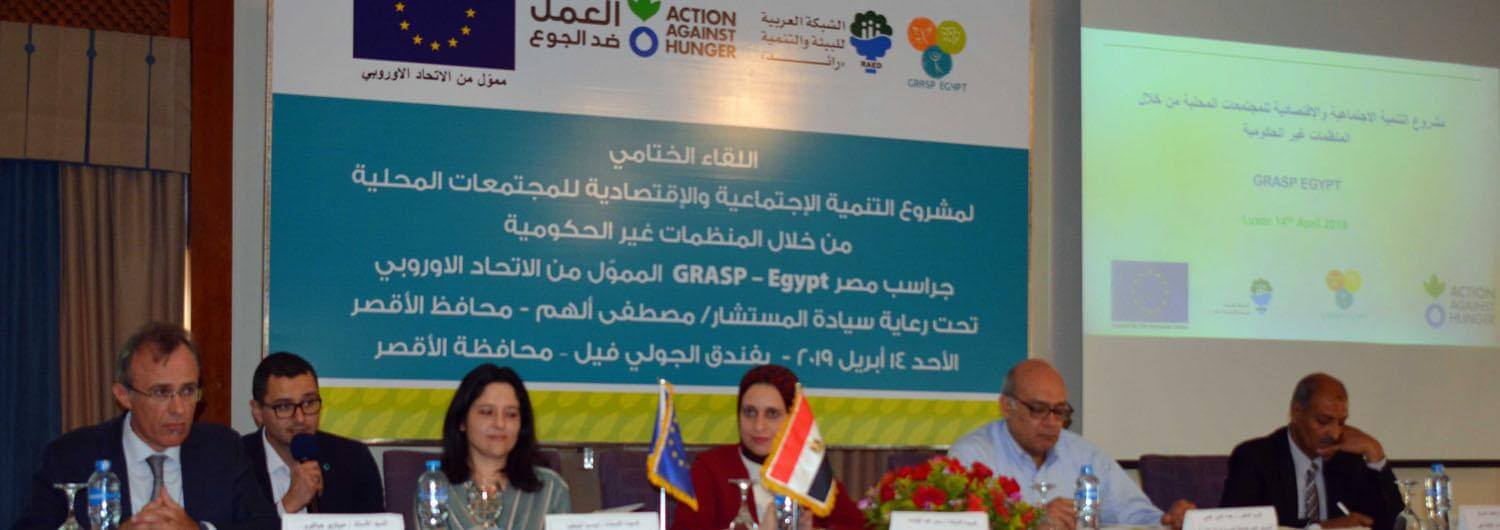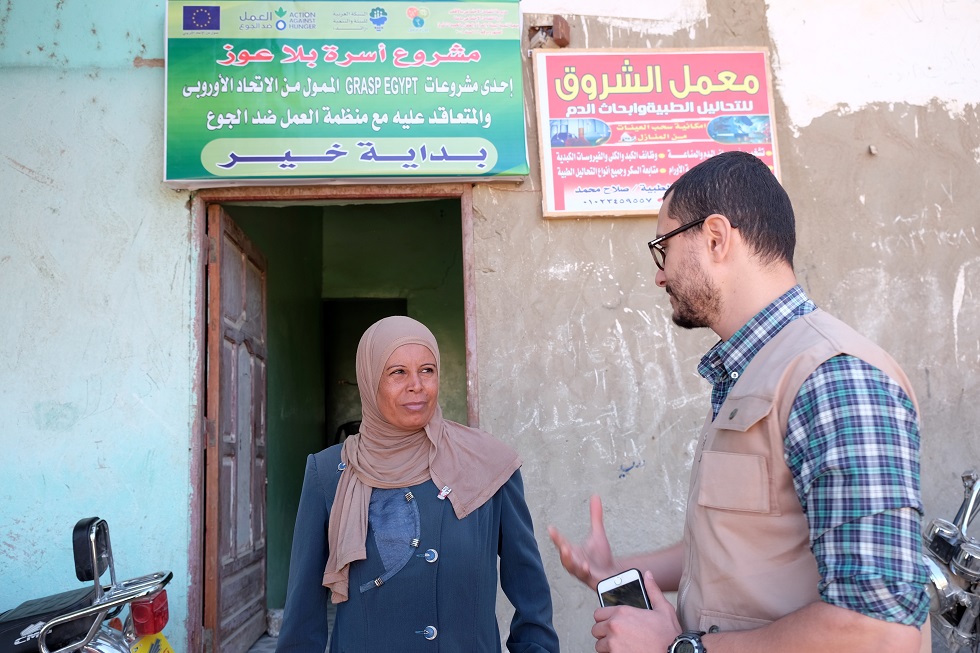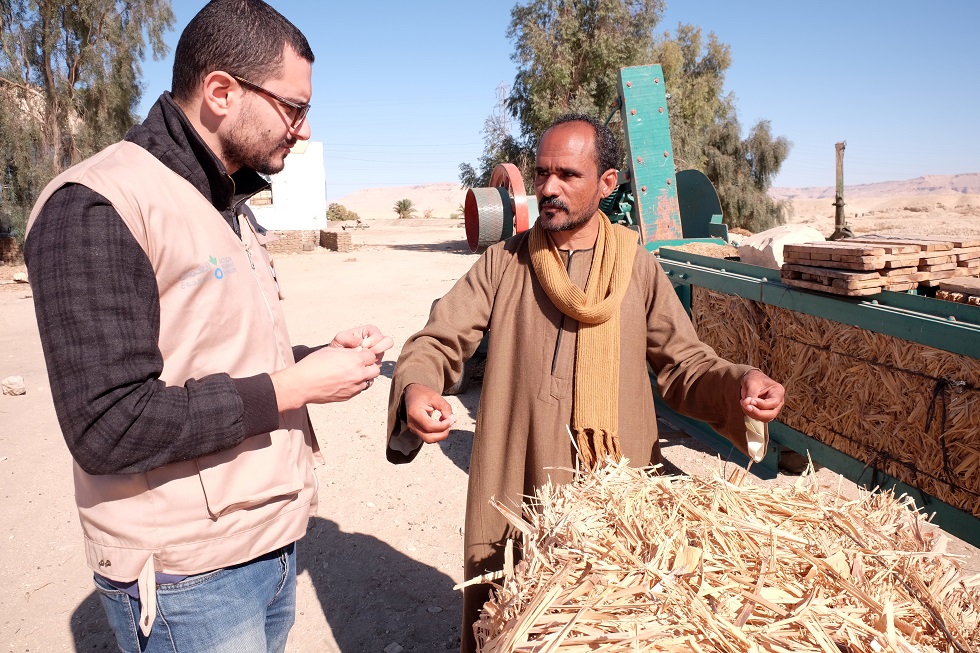News
GRASP Egypt: Grassroots Socio-economic Programme for Local Communities Development Clusters
16/04/19

GRASP Egypt, funded by the European Union, is one of the programs that aims to support civil society in collaboration with local authorities to contribute and improve the social, economic and living conditions of the poorest communities by building partnerships through empowering and building the capacity of local civil society.
Since January 2017 GRASP Egypt project, implemented by Action Against Hunger in partnership with the Arab Network for Environment and Development (RAED), has been able to reach out to local authorities as well as to establish a solid base inside the targeted communities through the implementation of a diversity of interventions in food security and livelihoods, water and environment, health and nutrition, vocational training and income generation.
The closing event of GRASP Egypt took place in Luxor, on April 14th, 2019 at the Jolie Ville Hotel. The most important results were presented under the support of His Excellency the governor of Luxor, Governor Mustafa Alham, the Ministry of Social Solidarity Directorate, Mr. Mahmoud Farouk, Mr. Maurizio Giachero, Diplomatic Attaché of the European Union Delegation Egypt to Egypt; Ms. Lucia Oliveira, Country Director of Action Against Hunger in Egypt; Dr. Emad Adly, General Coordinator of the Arab Network for Environment and Development. Many beneficiaries and grassroots organizations attended the event and gave their testimonies.
The project started in partnership with the Directorate of Social Solidarity in Luxor to increase the capacities of 53 associations. Several institutional trainings were given to build and upgrade the capacities of the grassroots associations, to identify weaknesses and strengths of each organization. These institutional trainings have included needs assessment, monitoring and evaluation and results-based management, as well as human resources, financial and procurement training, strategic planning and proposal writing, and the management of development projects.
In a second parallel step, GRASP Egypt in Luxor sub-granted a total of 81 micro-projects - 37 in Esna, 30 in Armant and 14 - were implemented by 61 grassroot organizations (the grantees) present in the 3 targeted districts of Luxor, Esna and Armant.
 The grantees of GRASP Egypt, during its two phases were able, in cooperation with the local authorities, to improve the economic and social conditions of the families most in need. In many places, for example, but not limited to, many projects focused on empowering women, and trained them in the work of sewing and embroidery and the manufacture of carpets and handicrafts. 325 women received sewing machines and materials to serve as a starting point for the implementation of micro-businesses that contribute to the improvement of their economic status.
The grantees of GRASP Egypt, during its two phases were able, in cooperation with the local authorities, to improve the economic and social conditions of the families most in need. In many places, for example, but not limited to, many projects focused on empowering women, and trained them in the work of sewing and embroidery and the manufacture of carpets and handicrafts. 325 women received sewing machines and materials to serve as a starting point for the implementation of micro-businesses that contribute to the improvement of their economic status.
In addition, through the GRASP Egypt project, many associations in the development of livestock have been able to meet the needs of rural livelihoods in Luxor, especially for the most families in need. They have provided several opportunities for raising pigeons, rabbits, small cows, sheep and goats as a non-refundable grant. From recycling the reproduction of the livestock, they reached other poor families where this action had some tangible economic effects that are increasing over time.
 Also, the projects of GRASP Egypt had their impact on the environmental reality by dealing with a number of important issues such as the issue of electricity and energy, saving irrigation water, climate change and environmental pollution. There is also a model for green houses, as it contributed to the inclusion of a large number of small farmers and made possible to grow and commercialize agricultural crops. GRASP has also contributed to the creation of an environmental model that transforms sugar cane residues into animal feed instead of burning methods that is one of the causes of air pollution.
Also, the projects of GRASP Egypt had their impact on the environmental reality by dealing with a number of important issues such as the issue of electricity and energy, saving irrigation water, climate change and environmental pollution. There is also a model for green houses, as it contributed to the inclusion of a large number of small farmers and made possible to grow and commercialize agricultural crops. GRASP has also contributed to the creation of an environmental model that transforms sugar cane residues into animal feed instead of burning methods that is one of the causes of air pollution.
The micro-projects also contributed to the idea of producing honey in the governorate of Luxor, which in turn resulted in the training of a large number of young people in the honey bee industry to start their micro-business, that is, contributing to employment opportunities for young people.
The project also contributed to the sector of the vocational training as a group of young people were trained on carpentry work. The project presented a model where other associations funded by GRASP Egypt contributed in completing this model by providing bed accessories to equip 100 beds produced at the carpentry workshop.
